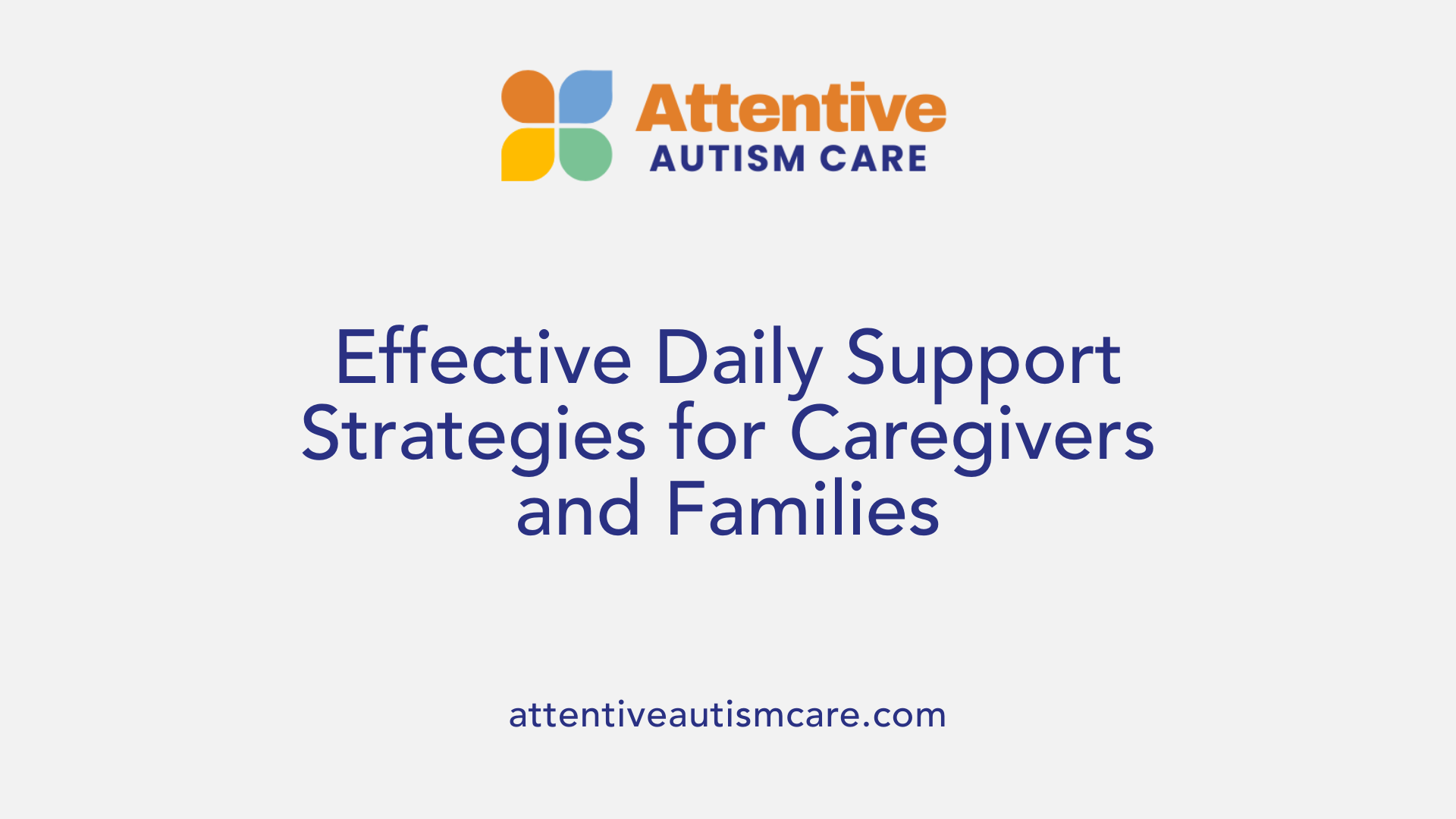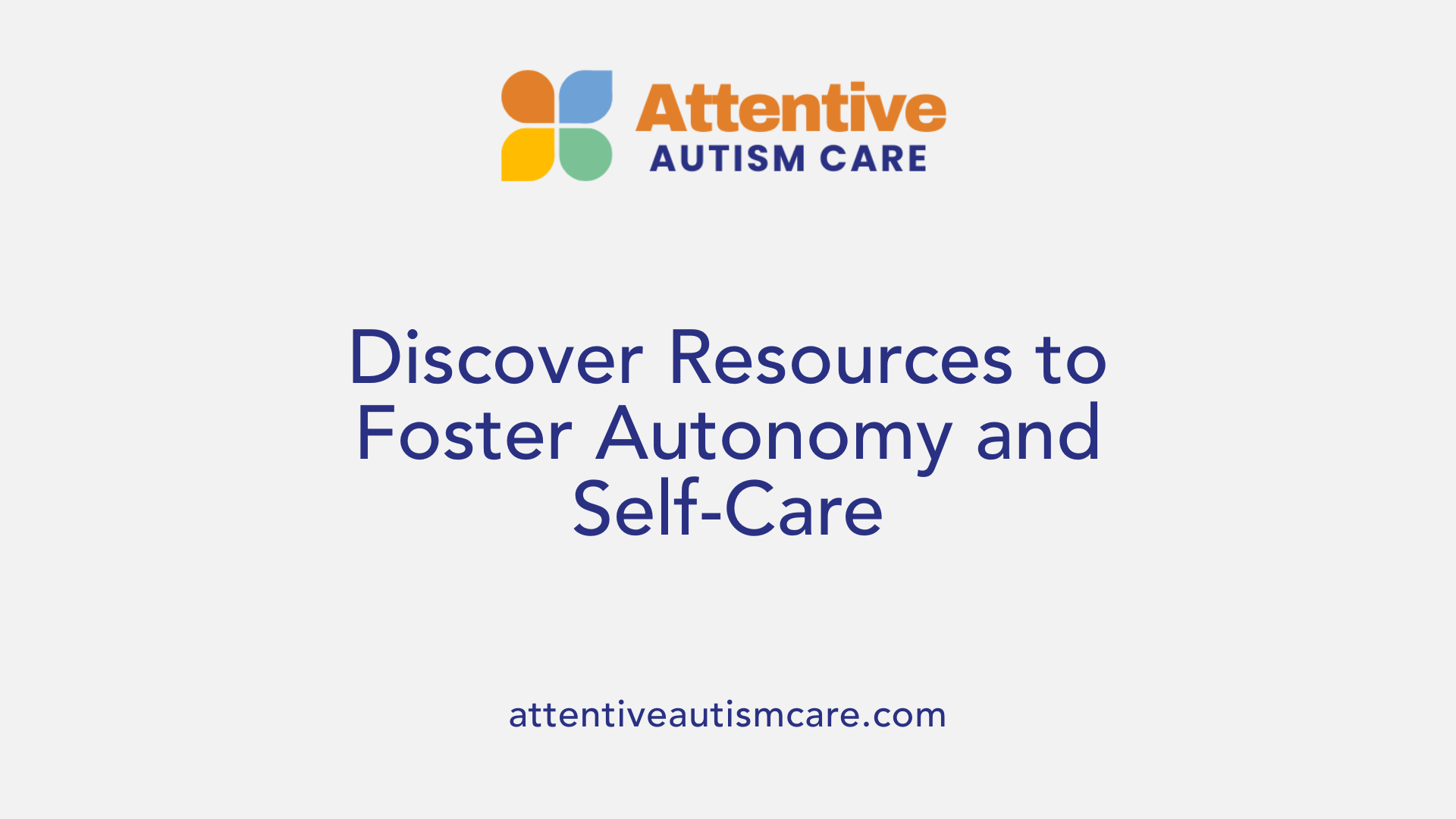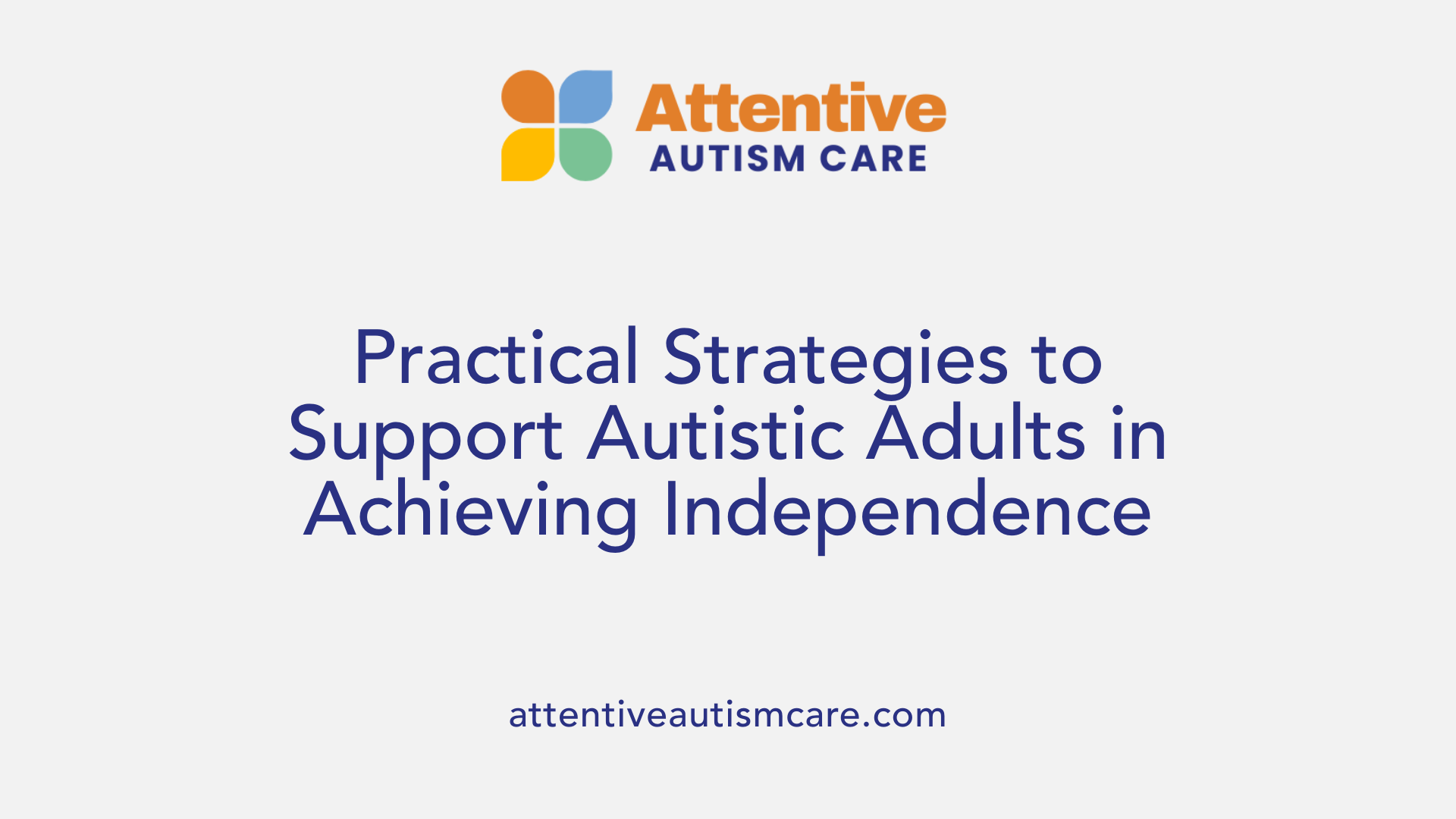Supporting Autistic Adults in Developing Independence and Self-Care
Empowering Autistic Adults for Autonomy and Well-Being

Understanding the Foundations of Support for Autistic Adults
Supporting autistic adults in developing independence and self-care is a multifaceted process that involves understanding existing frameworks, implementing evidence-based practices, and utilizing a range of resources and strategies. This article explores the current models, practical guidelines for caregivers, and essential resources aimed at fostering autonomy, resilience, and a high quality of life for autistic adults.
Frameworks for Life Skills Development in Autistic Adults

What frameworks exist for understanding and promoting life skills development in autistic adults?
Multiple models and approaches guide the development of life skills in autistic adults, focusing on individual strengths, needs, and goals. Person-centered approaches are foundational, emphasizing tailoring interventions to each person’s unique profile. These methods encourage active participation in goal-setting and decision-making, fostering autonomy and a sense of control over their lives.
Developmental and holistic frameworks expand on this by considering the individual's growth across various domains, including social, cognitive, emotional, and practical skills. These models support gradual learning, recognizing that skill acquisition occurs over time and in natural, everyday environments.
Recent research emphasizes frameworks that build self-actualization and resilience. These support the development of core skills such as self-care, self-advocacy, decision-making, and social engagement—all of which contribute to increased independence and improved quality of life.
Practical, real-world skills curricula are often integrated into these frameworks. Training in everyday tasks—like budgeting, transportation, cooking, and laundry—are commonly supported through visual aids, checklists, and community-based settings. Hands-on learning and environments that mimic real-life situations are proven effective for skill generalization.
Overall, these frameworks aim to foster self-awareness, independence, community participation, and resilience. They prioritize a holistic, individualized approach that combines structured skill development with naturalistic learning opportunities, ensuring autistic adults can lead fulfilling, autonomous lives.
| Framework Type | Focus Areas | Implementation Strategies |
|---|---|---|
| Person-centered | Strengths, preferences, goals | Tailored planning, active choice, self-determination |
| Developmental & Holistic | Growth across domains | Gradual skill progression, natural environments |
| Self-actualization & Resilience | Independence, well-being | Building self-care, self-advocacy, emotional resilience |
| Practical Skills Training | Daily living, social, community | Visual supports, real-world practice, community settings |
Practical Strategies for Daily Support from Caregivers and Families

What practical tips and guidelines can caregivers and families follow to support autistic adults in their daily lives?
Supporting autistic adults effectively requires a compassionate, organized, and personalized approach. Caregivers should focus on establishing predictable routines that help reduce anxiety and promote stability. Using visual schedules, checklists, and consistent daily patterns makes expectations clear and manageable.
Communication support plays a vital role. Respecting individual communication preferences—be it verbal language, assistive technology, or written cues—helps ensure meaningful interactions. Active listening, clear and literal language, and patience foster understanding and trust.
Sensory accommodations are critical because many autistic adults have specific sensitivities. Modifying environments to reduce stressors like bright lights, loud noises, or strong smells enhances comfort. Providing sensory tools such as fidget items, calming music, or quiet spaces allows individuals to self-regulate effectively.
Promoting independence and dignity is fundamental. Encouraging self-advocacy, supporting decision-making, and respecting autonomy empower autistic adults. Activities like managing personal care, participating in household chores, or engaging in community outings foster confidence and social integration.
To create a supportive environment, caregivers should avoid punitive reactions to behaviors like stimming or meltdowns. Instead, understanding their purpose and offering supportive options helps build trust and self-regulation.
Utilizing evidence-based, person-centered strategies ensures tailored support. Consulting trusted guidelines, like those from NICE, helps caregivers implement practices aligned with current best evidence. Continuous learning about autism, staying informed about new resources, and involving the autistic individual in planning are essential components.
Ultimately, fostering open communication, respecting individual differences, and maintaining a focus on dignity significantly enhance quality of life. Establishing a safe, accepting environment where autistic adults can thrive involves patience, empathy, and ongoing adaptation of support strategies.
Resources and Support Systems for Autistic Adults' Independence

What resources are available for fostering independence and self-care in autistic adults?
A wide array of resources exist to promote independence and self-care among autistic adults. Community-based programs play a crucial role in this support network. For instance, the Autism Housing Network offers assistance with secure housing options tailored to individual needs, while the DDS Independent Living Program provides targeted skills training in daily living and community integration.
Organizations like Easterseals are instrumental in providing recreational activities, social programs, and therapies aimed at strengthening communication, self-advocacy, and life skills. These services create opportunities for autistic adults to develop confidence and independence in various settings.
Vocational resources are also vital, including specialized job training, employment support programs, and career pathways such as the Coordinated Career Pathways initiative. These help adults find and maintain meaningful employment aligned with their interests and strengths.
Financial independence is supported through programs like Supplemental Security Income (SSI), Social Security Disability Insurance (SSDI), and ABLE Accounts, which provide financial stability and access to essential services. State-specific supports, such as Medicaid and the Working Disabled Program, further enhance economic self-sufficiency.
In addition, various tools—such as personalized ‘To Do’ lists, visual supports, and coaching—are instrumental in improving daily functioning. Skills assessments and tailored interventions help individuals understand their capabilities and areas for growth. The combination of community programs, vocational support, financial aid, and personalized tools works synergistically to foster greater independence and improve quality of life for autistic adults.
Enhancing Self-Care Skills in Autistic Adults

How can caregivers help autistic adults improve their self-care skills?
Supporting autistic adults in developing effective self-care routines is essential for fostering independence and wellness. Caregivers play a crucial role by teaching routines within familiar environments like the home, which provides comfort and predictability.
Using visual supports such as checklists and schedules helps clarify steps involved in hygiene, dressing, and nutritional habits. These visual cues make routines easier to understand and follow, reducing frustration and encouraging consistency.
Incorporating sensory-friendly tools can make self-care activities more comfortable. Items such as calming sensory accessories, personalized self-care kits with familiar textures, and visual guides cater to sensory sensitivities and boost confidence.
Gradual skill development is effective; caregivers can model activities, provide positive reinforcement, and rehearse skills in small, manageable steps. This phased approach allows autistic adults to master each aspect, from managing hygiene to selecting healthy foods.
Encouraging self-advocacy and decision-making within routines promotes autonomy. Supporting emotional regulation through mindfulness practices and sensory breaks further enhances resilience.
Access to professional therapies—such as occupational therapy, behavioral therapy, or counseling—can also support skill building by targeting specific challenges.
Promoting social engagement and peer support networks helps combat isolation and builds social skills along with self-care routines.
Ultimately, a comprehensive approach that combines visual supports, sensory accommodations, gradual teaching strategies, and professional guidance empowers autistic adults to take the lead in their self-care, improving their overall quality of life.
Strategies to Foster Independence in Various Life Domains

What are effective strategies for supporting autistic adults in developing independence?
Supporting autistic adults to become more independent requires a comprehensive approach tailored to individual needs. One of the foundational strategies involves creating personalized plans that target self-management, self-monitoring, and self-determination. These plans often utilize visual supports such as 'to do' lists, checklists, and visual schedules, which help individuals organize tasks and understand routines clearly. This visual approach fosters greater autonomy by making everyday activities more manageable.
Integral to building independence is the incorporation of routine activities like self-care, household chores, and community safety training. Teaching skills such as washing dishes, managing personal hygiene, crossing streets safely, and understanding public transportation helps adults navigate daily life confidently. Addressing mental health through daily practices like breathing exercises, calming techniques, and sensory regulation also plays a significant role in maintaining overall well-being.
Structured teaching methods like the TEACCH® approach offer consistent frameworks for skill acquisition. Embedded teaching strategies such as SWAT Support enable staff and caregivers to incorporate teaching into real-life interactions seamlessly. These tools help promote functional skills across home, community, and workplace environments.
Furthermore, empowering adults with access to community resources, employment services, and financial management tools significantly enhances independence. For example, support programs like Supported Employment and financial tools such as savings accounts or budgeting apps help foster economic independence.
Combining these strategies with ongoing modeling, support, and individualized accommodations ensures sustained progress. The goal is to promote self-reliance while respecting individual preferences and strengths, ultimately enhancing quality of life and community participation.
For more information, searching for "Developing independence in autistic adults" can provide additional insights into effective community-based programs, therapies, and support systems that facilitate this developmental journey.
Evidence-Based Practices for Enhancing Life Skills
What are some evidence-based practices for enhancing life skills in autistic adults?
Supporting autistic adults in developing essential life skills involves implementing practices grounded in research that focus on individual needs and real-world application. One effective approach is the use of personalized and structured teaching methods. These include functional skill training programs that target specific skills such as self-care, money management, and employment readiness.
Community-based interventions are also vital. These programs assess the individual's environment and needs, offering tailored support that promotes independence in natural settings. For example, community assessments like the Community-Based Skills Assessment help identify areas for growth and guide intervention efforts.
Visual supports play a crucial role in fostering independence. Utilizing checklists, visual schedules, and visual aids helps individuals understand routines and expectations, making daily activities more manageable. Visual supports are especially beneficial when teaching complex tasks like cooking, shopping, or using public transportation.
Building self-advocacy is an integral part of life skills development. Programs that teach decision-making, self-awareness, and self-advocacy empower autistic adults to communicate their needs and preferences effectively. This fosters greater autonomy and improves overall quality of life.
An example of an effective program is "Surviving and Thriving in the Real World (STRW)," which combines group sessions, task breakdown, and reinforcement strategies to enhance daily living and community skills. Such interventions emphasize a hands-on approach, encouraging real-world practice, which is critical for meaningful skill acquisition.
In addition, ongoing research underscores the importance of addressing social communication, resilience, and self-determination skills. These components support long-term independence and help autistic adults navigate challenges in employment, community participation, and personal living.
By focusing on individualized plans that incorporate visual supports, community engagement, and self-advocacy development, caregivers and professionals can facilitate meaningful advances in life skills, ultimately promoting greater independence and well-being.
Supporting Well-Being Through Self-Care and Self-Knowledge
How can supporting independence and self-care improve the quality of life for autistic adults?
Supporting independence and self-care plays a vital role in enhancing the overall quality of life for autistic adults. When individuals develop skills in managing daily routines, personal hygiene, financial transactions, and decision-making, they gain a sense of control and confidence. This progress fosters self-knowledge, allowing autistic adults to understand their strengths, preferences, and limits.
Focusing on self-care routines, which include mental health practices like mindfulness, grounding exercises, or engaging in special interests, helps reduce stress and emotional overload. Implementing personalized tools such as sensory supports, calming apps, or visual checklists can improve emotional regulation and resilience.
Encouraging participation in community activities—like volunteering, hobbies, or social groups—enhances social inclusion and provides a sense of belonging. Developing vocational skills and promoting self-advocacy also support greater independence in work and social settings.
A holistic approach that combines skill-building, community engagement, and mental health support can break down societal barriers. Addressing stereotypes and providing appropriate accommodations foster a more inclusive environment. Family involvement, combined with access to community resources and systemic supports, helps balance autonomy with necessary guidance.
Ultimately, such comprehensive support can lead to improved health, greater social participation, and overall life satisfaction. Autistic adults who feel empowered to pursue their goals and manage their well-being are more likely to achieve meaningful, fulfilling lives.
| Aspect | Focus Area | Support Strategies |
|---|---|---|
| Mental health practices | Stress reduction, coping skills | Mindfulness, therapy, sensory tools, hobbies |
| Self-awareness & strengths | Personal growth and identity | Strengths-based approaches, self-reflection tools |
| Community engagement | Social inclusion and participation | Volunteering, hobby groups, community resources |
Support for independence goes beyond just skill development; it encompasses fostering confidence, resilience, and a sense of purpose, all of which contribute to a higher quality of life for autistic adults.
Moving Forward with a Strengths-Based, Individualized Approach
Supporting autistic adults in developing independence and self-care requires a comprehensive, personalized methodology that respects their unique strengths, needs, and aspirations. Utilizing frameworks that promote self-actualization and resilience, coupled with practical strategies like visual supports, routines, and community resources, can foster greater autonomy, well-being, and community engagement. Caregivers, professionals, and community organizations all play a vital role in providing accessible support, promoting self-determination, and reducing systemic barriers. Embracing neurodiversity and respecting individual identities are essential to enhancing quality of life. As research continues to evolve, integrating evidence-based practices with compassionate, person-centered care will lead to a future where autistic adults thrive with independence, dignity, and purpose.
References
- Ten Ways to Build Independence
- Strategies for Autistic Adults to Achieve Greater ...
- Understanding and Supporting Autism in Adulthood
- Life skills for autism
- 20 Essential Resources for Autistic Adults that Support ...
- Framework for developing self-actualization skills in young ...
- Autism and Self-Care




































































































